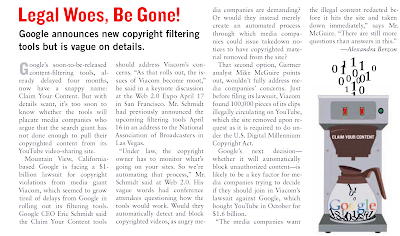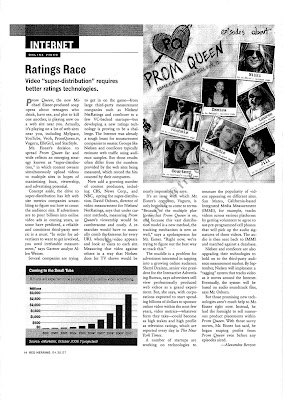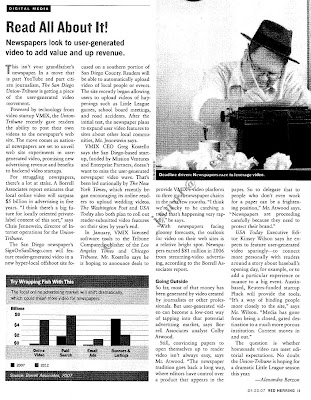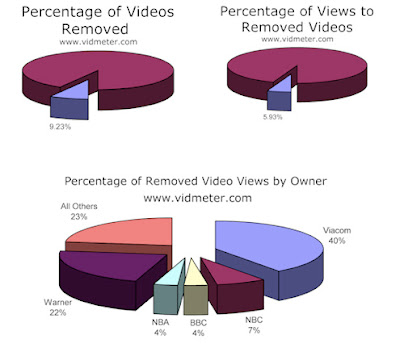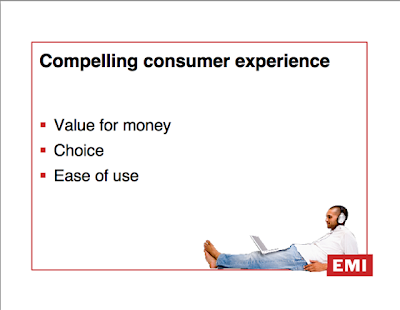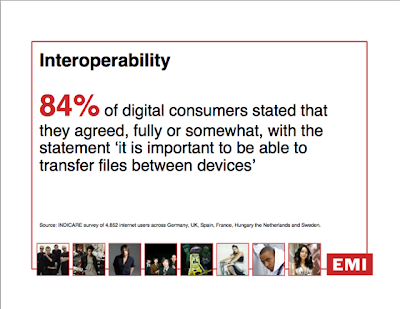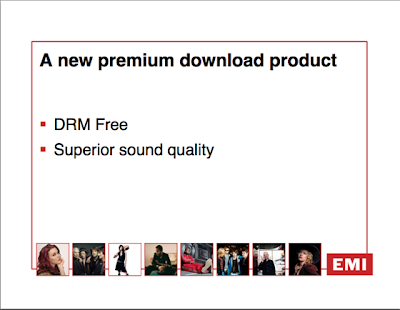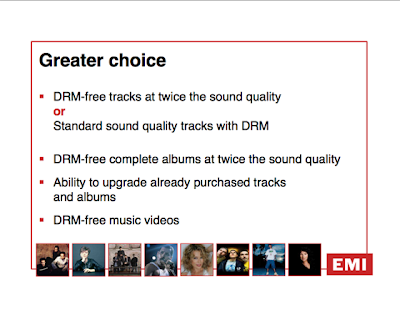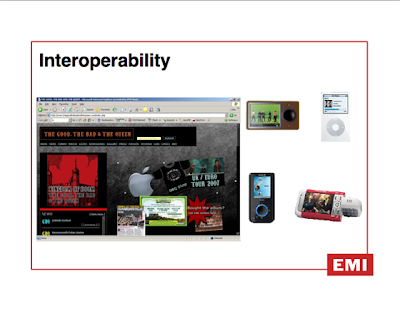Friday, April 27, 2007
Video "super-distribution" requires better ratings technologies
Posted by
Chris
at
2:05 PM
0
comments
![]()
Labels: UGC website, video
Wednesday, April 25, 2007
Autonomy Exercises Option To Buy Blinkx
Merges With Its Consumer Division; Will IPO It In London
This is among the first such IPOs in the still-nascent online video search space between the data/information search company Autonomy and video search consumer site Blinkx.
The UK-based Autonomy has exercised an option to take over the consumer site Blinkx. The site had about $10-12 million invested in it since it founded in 2003. With the takeover, Autonomy is spinning off its consumer division (the technology of fingerprinting -ACID- has been announced few weeks ago), merging it with Blinkx Inc (the video search site), renaming the two together as Blinkx, plc.
Posted by
Chris
at
3:12 PM
0
comments
![]()
Labels: Virage (Autonomy)
Tuesday, April 24, 2007
Two Big Reasons Why a YouTube Filter Will Lead to More Problems
A YouTube filter won't prevent Google from being sued. And it won't help in their current lawsuit with Viacom. In fact, if it works, a filter could actually demonstrate that infringing content acts as a customer draw. And that, in itself, presents some very big legal problems.
Below, two big reasons the filter will cause more problems.
1. The filter will help demonstrate how much infringing content is on YouTube
If the filter works -- a big if, of course -- then traffic will go down. Not total traffic, mind you, that could still go up. But traffic to certain areas of the site and certain types of content. A litigant against YouTube could request that data, much like Titan media requested -- and received (yesterday!) -- that data from vid share site Veoh.
According to some interpretations of A&M Records v. Napster, it's illegal for copyrighted content to act as a draw when the host of that content receives financial benefit. Veoh argued that they never benefited financially from porn, but according to court documents, "at least one district court has concluded that..."a broad definition of ‘direct financial benefit’ would encompass even a ‘future hope to monetize.’” That court was deciding Perfect 10 v. Google.
2. The filter won't work, and thus will make YouTube liable
There's a danger that YouTube could make itself legally vulnerable by implementing a filter that doesn't work like the media companies want it to. After all, if YouTube is aware of the infringing activity then, under the DMCA, they're liable.
This was exactly the issue a few months prior in MGM v. Grokster, which is still kicking around in LA district court, where the only defendant left is Streamcast. Streamcast, beaten and about to implement a filter, is worried that any filter it does provide will be imperfect, and thus open them to liability.
That's why, I assume, Schmidt is calling this new program "Claim Your Content." (emphasis mine.) I'm willing to bet that any filtering mechanism on the site won't really be a proactive filter, it'll be a post facto filter that allows content owners to expeditiously search and remove content. That removes Google from the liability of having foreknowledge of infringing content, and allows them to provide the filter without input from the media companies.
Posted by
Chris
at
1:02 PM
0
comments
![]()
Labels: copyright
Anticipating Google’s ‘Claim Your Content’
“Claim Your Content” is “not a filtering system” that will block uploads, said Google CEO Eric Schmidt, responding to a question from RBC Investments Jordan Rohan during the press conference call announcing the results of Google’s earnings for the first quarter. “Google is building a tool which is called Claim Your Content, and it allows publishers to somewhat automate the takedown process.”
DMCA compliance is the focus of the project, and “will address many of the operational complaints people are making about the workload that the DMCA has put on them,” Schmidt explained.
Companies like Revver employ a staff to police content on the site, and it’s clear that YouTube has the ability to quickly take down pornography. But Google is notoriously loathe to employ meatware solutions, and in this case may neatly avoided the issue by shifting the unprofitable policework onto the backs of rights holders.
Given this information, it sounds like rights holders will flag a clip and then somehow prove that they’re the owner; once verified, Google may use technology like Audible Magic to help identify clips with similar content as they’re uploaded; owners can then review a selection of potentially unauthorized clips and flag infringers; YouTube could then automatically pull the clip and send the necessary form letters via email to the parties involved.
Schmidt’s remarks indicated that the system won’t be perfect, only that “it addresses vast majority of complaints.”
Posted by
Chris
at
10:01 AM
0
comments
![]()
Labels: Audible Magic
Viacom Admits Error in YouTube Takedown; Groups Drop Lawsuit
San Francisco - A lawsuit filed against Viacom by the creators of a parody video removed from YouTube as a copyright violation has been dropped, after Viacom admitted that it erred in seeking to have the video taken down.
Digital civil liberties group the Electronic Frontier Foundation (EFF) and Stanford Law School's Fair Use Project filed the suit on behalf of MoveOn.org and Brave New Films, whose "Stop the Falsiness" video parodied and used elements of Viacom's "The Colbert Report" program. The groups said the video falls under the "fair use" provisions of copyright law, and thus the takedown notice from Viacom was unfair.
The EFF also said Viacom initially denied asking YouTube to remove the video, but later conceded it was the source of the request. The company agreed to create a website and e-mail hotline to review any similar complaints over takedown notices in the future.
Posted by
Chris
at
9:31 AM
0
comments
![]()
Labels: copyright, labels/studios, UGC website
Monday, April 23, 2007
Policing Web Video With 'Fingerprints'
By KEVIN J. DELANEY, BROOKS BARNES and MATTHEW KARNITSCHNIG
Can "fingerprinting" bring a truce to the Web's video-copyright wars?
The technology is based on the premise that any video content has unique attributes that allow it to be identified even from a short clip -- just as a human fingerprint identifies a person.
Proponents of fingerprinting technology say it can help spot TV shows and films that are posted on video-sharing sites such as Google Inc.'s YouTube without their owners' permission, so the sites can remove them or share advertising revenue. That's a significant development amid copyright battles between media and technology companies, including Viacom Inc.'s $1 billion suit against Google filed in March. But a series of legal, technical and financial issues remain to be solved even as video sites including Google, News Corp.'s MySpace Video and Microsoft Corp.'s Soapbox, amid pressure from media companies, are testing fingerprinting or putting it in place.
Google's YouTube every day takes in hundreds of thousands of video clips, from amateur pet videos to clips of commercial movies and TV shows, that are uploaded by consumers. The company has struck deals with some copyright holders, such as the United Kingdom's British Broadcasting Corp., to run their videos and share some ad revenue. And it says it will remove any content that is posted without the copyright holders' permission when it receives specific complaints. But Google has said it needs media companies' involvement because on its own it can't distinguish between video that the copyright holders want posted and material posted without the owners' permission.
That's because Google doesn't know if the user uploading the video truly holds the copyright to a work or if the description the individual provides of the material is accurate. Some consumers, for example, spell the names of TV shows backward in the titles of pirated clips they upload in order to thwart detection by media companies.
General Electric Co.'s NBC-Universal says it plans to participate in a test of fingerprinting on YouTube that it expects to start shortly. Technical staffs from the two companies are working together and they hope to have results by this summer, according to NBC.
People familiar with the matter say that Google is using fingerprinting technology from closely held Audible Magic Corp. of Los Gatos, Calif., as it separately pursues an internal effort to build its own. NBC was chosen for a Google test, which NBC expects to take place from April through June, partly because it understands the difficulties of such technology, according to one person familiar with the matter.
A YouTube spokeswoman said it looked forward to working with a variety of content owners on "content management technology," but declined to comment on the specifics of any tests, timing or technology being used. YouTube announced last fall it planned to introduce content-identification technology by the end of 2006 as part of partnerships with CBS Corp. and others. Google Chief Executive Eric Schmidt later said fingerprinting technology was an answer to copyright concerns, but that it was difficult, which prompted some media companies to complain Google was dragging its heels.
NBC has been agitating for Google to move faster to put a fingerprinting system in place, contending in recent months that the Internet giant hasn't made battling piracy a priority. Now that Google is starting a test, the media company has for the moment tabled any plans to join Viacom in pursuing legal options. "We see progress," said NBC General Counsel Rick Cotton in an interview. CBS says it is also having "constructive conversations" with YouTube about fingerprinting.
Mr. Cotton and other media executives believe the fingerprinting pendulum has started to swing in their direction. In particular, they cite the piracy-protection component of a new NBC Universal-News Corp. joint venture to distribute TV shows and movies on the Web. In return for allowing viewers to watch their programming on Time Warner Inc.'s AOL, Microsoft, MySpace and Yahoo, the two big media companies got the Internet firms to agree to proactively screen for pirated video. "That removes entirely the notion that this is so technically difficult that it can't be done on a large scale," says Mr. Cotton.
AOL says it isn't using fingerprinting technology, but is willing to do so once a standard emerges. Yahoo isn't currently, and declined to comment on any future plans.
At the same time, some media executives say Google's plans don't go far enough, because Google has said it won't use fingerprinting to block clips from being placed on the site, something known as "filtering." Instead, Google is expected to use fingerprinting to flag pirated clips to the content owners, which then have to request they be removed. "It sounds like some kind of crazy lost and found," a senior executive at one of the big media companies says. "It's not going to be enough," says another.
Lawyers for the media companies say that Google finds itself in a conundrum: It wants to appease the content owners it views as important partners for YouTube but is concerned that filtering might increase its liability for copyright infringement claims. The YouTube spokeswoman said, "The law is clear, copyright owners have the responsibility to identify infringing material they want removed," adding that YouTube will continue to exceed its own responsibilities under the law while letting people upload video easily and quickly to the site.
Video-sharing sites such as YouTube say they are protected from liability for copyright claims under "safe harbor" provisions in the Digital Millennium Copyright Act of 1998. But, under the DMCA, sites that have "actual knowledge" or control of infringing content can lose such protections. "What these filters do is potentially create more knowledge, more awareness of what's going on," says Fred von Lohmann, senior intellectual-property attorney at the Electronic Frontier Foundation in San Francisco. "There is some residual risk that you could lose the safe-harbor protections if you have too much of that kind of knowledge."
Mr. von Lohmann said Google's expected approach of flagging content for owners to review and request removal is a plausible middle ground. Some fingerprinting companies such as Audible Magic say their role as an independent third party could also resolve sites' concerns about having knowledge of piracy that could endanger their protection from liability. Microsoft, for one, says it is using fingerprinting technology from Audible Magic to proactively block clips from being posted to its Soapbox video-sharing site without permission and also providing content owners with tools to request removal of clips that slip through.
With Audible Magic's system, media companies provide copies of their music, TV shows and films that it analyzes, adding their fingerprints to a central database. Video-sharing sites can use Audible Magic software to extract fingerprints for clips that users upload, and then look in Audible Magic's database for a match. Other fingerprinting systems work similarly.
Some sites have raised questions about the efficacy of current filtering technology, particularly when it's used on a mass scale and applied to the clips of varying length and quality users upload. A person familiar with the expected NBC-Google test says the Audible-Magic-based technology being used is imperfect and could frustrate media companies when clips slip through.
The Motion Picture Association of America, a proponent of fingerprinting, has been testing technology from 12 organizations. "One of the things we've been impressed with is it actually works," says Dean Garfield, chief strategic officer at the MPAA, the Hollywood lobbying group.
Audible Magic Chief Executive Vance Ikezoye says his company's fingerprinting technology, whose users include MySpace Video, Sony Corp.'s Grouper, Break.com and GoFish Corp., is more than 99% accurate when it's used to examine a clip where the image and audio quality aren't degraded. Audible Magic's fingerprinting, originally designed for use with music, looks primarily at the audio tracks and requires a TV or film clip to be about 20 to 30 seconds long minimum to reliably analyze it. The company says it is testing technology that also examines the video component of the clips.
Audible Magic charges sites a monthly fee for its service, which it says can add up to about $1 million annually in some cases. But it and other fingerprinting companies say the business models for their services aren't totally worked out.
Even fingerprinting proponents, however, acknowledge it's not a silver bullet to media companies' copyright headaches. For starters, users could find pirated videos on sites without it. "I suspect people will try to find -- and will find -- a workaround," says the MPAA's Mr. Garfield.
Write to Kevin J. Delaney at kevin.delaney@wsj.com, Brooks Barnes at brooks.barnes@wsj.com and Matthew Karnitschnig at matthew.karnitschnig@wsj.com
Posted by
Chris
at
9:31 AM
0
comments
![]()
Labels: Audible Magic, fingerprint database, Vobile
Thursday, April 19, 2007
Newspapers look to user-generated video to add value and up revenue
Posted by
Chris
at
4:34 PM
0
comments
![]()
Labels: UGC website
Wednesday, April 18, 2007
User-Generated Content Is Top Threat to Media and Entertainment Industry
NEW YORK; April 16, 2007 –Media and entertainment executives see the growing ability and eagerness of individuals to create their own content as one of the biggest threats to their business, according to results of a survey released today by Accenture.
In its annual survey of senior executives in the media and entertainment industry, Accenture examined the growth strategies of companies across the landscape of advertising, film, music, publishing, radio, the Internet, videogames and television.
More than half (57%) of the respondents identified the rapid growth of user-generated content — which includes amateur digital videos, podcasts, mobile phone photography, wikis and social-media blogs — as one of the top three challenges they face today. In addition, more than two-thirds (70%) of respondents said they believe that social media, one of the largest segments of user-generated content, will continue to grow, compared with only 3% of respondents who said they view social media as a fad.
The new landscape offers opportunities as well as challenges, according to the study, as two-thirds (68%) of the respondents said they believe that within three years their businesses will be making money on user-generated content. 62% said they believe their companies will make money through advertising and sponsorships of social media. Other sources of profits cited were subscriptions (21%) and pay-per-play offerings (18%). However, a quarter (24%) of respondents said they do not yet know how their businesses will profit from user-generated content.
Asked to identify which type of content offers the highest growth potential for their industry over the next five years, the greatest number of respondents — 53% — cited short-form video, followed by videogames (13%), full-length film (11%) music, (11%), consumer publishing (9% and business publishing (4%).
Methodology
Accenture surveyed 110 senior executives at advertising, film, music, publishing, radio, Internet, videogame and television companies in North America (60% of the respondents) and Europe (40% of the respondents).
Posted by
Chris
at
3:38 PM
0
comments
![]()
Labels: labels/studios, UGC website
Tuesday, April 17, 2007
YouTube 'very close' to filtering system
By Greg Sandoval
Staff Writer, CNET News.com
Published: April 16, 2007
LAS VEGAS--Google is very near enacting a filtering service that would prevent copyright content from being uploaded to video-sharing site YouTube, CEO Eric Schmidt said Monday.
Schmidt made the comments to about 300 people here at the National Association of Broadcasters conference during a one-on-one interview with John Seigenthaler, the former reporter with NBC's Nightly News.
The new system, which he called Claim Your Content, will automatically identify copyright material so that it can be removed, Schmidt said.
Posted by
Chris
at
8:39 AM
0
comments
![]()
Labels: YouTube
Monday, April 16, 2007
Video Filtering to Get Standards
By Alexandra Berzon
Judgment day, of sorts, is near for video filtering
The Motion Picture Association of America is rolling out a report within a few weeks that evaluates video-filtering software and establishes standards for copyright protection online. This sounds like good news for a nascent software space, but it also opens the door to a new set of tricky problems, insiders say.
“Once this evaluation ends, the negotiations begin,” said Brian Dunn, senior vice president for business development at the Paris-based Advestigo, which submitted technology to MPAA testing.
Why? User-generated sites like YouTube have become breeding grounds for copyrighted videos, provoking the ire (and legal arm) of copyright holders. That’s created an opening for entrepreneurs looking to cash in with tools designed to automatically catch illegal content before it appears online.
Video-sharing sites say they’re not required by law to implement filtering. But many now are choosing to do so in order to make deals with media companies. Viacom’s recent copyright lawsuit against YouTube has only added momentum.
Meanwhile, the filtering software space is chaotic. Only one company’s software―the Los Gatos, California-based Audible Magic―is widely used, and even that offers only audio soundtrack filtering so far.
Broken System
Enter the MPAA, the trade organization for film studios that has been generally aggressive on the spread of illegal videos online.
In September, it asked filtering companies to submit their tools for testing. The trade organization was seeking technology that can take a piece of video and create a unique fingerprint based on the video’s content. That fingerprint is used to accurately match and identify similar content even when the video has been severely altered, re-edited- and re-coded.
Twelve filtering software companies responded to the inquiry, and so far they have all more or less stood up to the scrutiny, MPAA officials say.
“Highly viable technologies will come out of this,” said Dean Garfield, MPAA’s legal director, who wants peer-to-peer networks, Internet service providers, and video-sharing sites to access the tools.
Video site executives agreed the standards could help in mending and building their relationships with studios.
No Panacea
But it won’t solve all the problems in this still-developing area, they say.
“The system is highly broken,” said Aaron Cohen, CEO of video-sharing site Bolt Media, recently acquired by the publicly traded GoFish. The merged company licensed filtering tools from Audible Magic after Bolt settled a copyright suit with Universal Music Group.
And the question of who will support the companies scrambling to get in on filtering is less clear.
Advestigo’s Mr. Dunn is concerned that YouTube will develop filtering tools in-house. Then a huge chunk of his potential market will vanish.
Posted by
Chris
at
4:30 PM
0
comments
![]()
Labels: Advestigo, Audible Magic
Friday, April 13, 2007
CBS announcement for online distribution
CBS is announcing today its own “Interactive Audience Network” to distribute free television shows such as CSI, Late Show with David Letterman, and Survivor through all sorts of online platforms. The network has made arrangements with AOL, Microsoft, CNET Networks, Comcast, Joost, Bebo, Brightcove, Netvibes, Sling Media, and Veoh to showcase its content, and Akamai to deliver it.
Posted by
Chris
at
8:21 AM
0
comments
![]()
Labels: labels/studios, video
MGM & Apple
MGM Studios has signed a deal with the iTunes store to sell catalog titles but not new releases. The 24 new films bring Apple’s motion picture library up to a meager 500 films, which would make for a small video rental shop indeed. As Variety points out, the $9.99 price point for back catalog titles is more than bargain-bin DVDs like MGM’s Dances With Wolves might sell for otherwise.
Posted by
Chris
at
8:16 AM
0
comments
![]()
Labels: labels/studios, video
Tuesday, April 10, 2007
100 Million iPods Sold
It took just over five years, but Apple has sold its 100 millionth iPod.
iTunes is keeping up its share of the bargain, too. 2.5 billion songs, 50 million TV shows and over 1.3 million movies have been purchased through the service.
(The iTunes Store features over five million songs, 350 television shows and over 400 movies.)
Vuze: New Name for Zudeo (Azureus)
Azureus also announced deals on Thursday to distribute the BBC show Sorted, and the Showtime properties Weeds, Dexter and The L Word.
Posted by
Chris
at
11:36 AM
![]()
Labels: UGC website
Friday, April 6, 2007
ACID Scans Web for Pirated Multimedia
The Virage division of Autonomy has developed search technology that can scan the Web for pirated video and multimedia clips.
ACID (Automatic Copyright Infringement Detection) can detect illegally posted rich media in any format wherever it is posted, according to Autonomy founder and CEO Michael Lynch.
"Acid watches very large amounts of video and it can spot video that is owned by someone else," in a highly automated process, Lynch said. It could be used to detect movies, television clips or any copyrighted media posted, for example, on YouTube, on personal Web sites or on any other Web site, according to company officials.
The technology is equally useful to these file-sharing sites, because it gives them the means to scan their sites for infringing media before it's posted, or at least before it results in a lawsuit. The technology allows these scans to be performed quickly to avoid lengthy delays in posting new content online.
ACID uses Autonomy's "meaning-based computing" technology, which allows computers to find relationships within many different types of unstructured data, including text, word processing documents, e-mails, audio and multimedia.
Acid uses patented image and audio analysis technology to look for known examples of copyrighted material no matter what format it's stored in. ACID is also based on Autonomy's IDOL (Intelligent Data Operating Layer), a basic search platform that can analyze information in more than 1,000 formats including text, voice and video.
Since ACID works with all media formats, it can detect whether a portion of a copyrighted video or audio tract has been overlaid or stored as part of a new and original media file.
Posted by
Chris
at
5:01 PM
0
comments
![]()
Labels: Virage (Autonomy)
Life After Apple Lock-up
By Alexandra Berzon
EMI’s decision to sell unprotected song tracks on Apple’s iTunes online store had many industry observers wondering whether the record label’s stunning about-face would prompt rival music companies to follow suit.
Copyright protection software—also known as digital rights management or DRM—has long been a contentious issue dividing the record industry and online music retailers. The labels have insisted music retailers used DRM software to prevent piracy by strictly controlling how people could enjoy their music. Apple, Microsoft, and others responded with developed proprietary DRM that is annoyingly incompatible with each other’s products.
The status quo has been awkward, but it has also enabled a small but entrepreneurial group of startups to develop software and services that work with, or work around, cumbersome DRM software. But by Monday, the possibility that more music labels could follow EMI’s lead prompted many startups to begin reassessing their assumptions and business plans.
“This is a bombshell,” said John Beezer, president of the self-funded Seattle-based Shared Media Licensing. “We’ll look back on this as the moment when everything changed.”
The timing could not have been better for Mr. Beezer, who spent the past weekend preparing to shut down his online music service Weedshare, because of DRM incompatibility issues with the new version of Windows Media Player. Weedshare allowed users to play songs three times for free before having to pay, but his service wouldn’t work with the newest Windows Media software.
Now with the EMI announcement, Mr. Beezer is considering a business plan he thought wouldn’t be possible for a long time—an open music platform.
“We thought the open strategy made the most sense, but we thought the major labels would never go for it,” said Mr. Beezer. “The news about EMI really shifted that equation. Now we’re thinking, ‘Oh my god. They really will go for open formats.’”
Mr. Beezer said he is going to start working under the same assumption that many industry insiders and analysts put forth in the wake of the news—that DRM will no longer be seen as a technology that locks people into specific playback formats and limits. Instead, he predicted, DRM will evolve into a “fingerprinting” tool that monitors when consumers play songs so they can be charged accordingly.
“For startups working in the DRM space, it’s now about creating better accounting and tracking rather than locking things up completely,” said Gartner analyst Mike McGuire.
Paris-based Advestigo is one such company. Funded by I-Source Gestion, CapDecisif, and EonTech Ventures, the company makes fingerprinting and music tracking software for music labels. Executive vice president for business development Brian Dunn believes his group could well see a surge in business in the wake of the EMI announcement.
“This is a many-to-many instead of a one-to-many distribution model,” said Mr. Dunn. “Therefore, you’ve got to tag the content and follow the content, and figure out monetization.”
Christopher Levy of the closely held Austin, Texas-based BuyDRM was one of those who was not so eager to contemplate the possibilities in the wake of EMI’s announcement. His company provides DRM technology to artists and record labels and he views the EMI announcement as a desperate move by a desperate music company trying to get around iTunes’ dominance in online sales.
“This is not the bellwether for the rest of the industry,” said Mr. Levy. “As long as there is media, there is going to be digital rights management. We can’t assume the music industry as a whole will abandon this. All things of value have some protection, and that’s not going to change.”
Posted by
Chris
at
11:55 AM
0
comments
![]()
Labels: Advestigo
Thursday, April 5, 2007
GodTube? Seriously? Well...
Have you ever used a banana to prove the existence of god?
You, iconoclast.
Posted by
Chris
at
11:39 AM
0
comments
![]()
Labels: no comment
MySpace Makes Nice With Music Widget-Makers
...
MySpace is asking developers to register their music catalogs with Audible Magic, the company that provides copyright authorization (aka fingerprints) songs for MySpace, GoFish, Microsoft and MTVN. By doing this, MySpace execs say they're hoping to protect their company from copyright-infringement lawsuits.
"By using a third-party provider's database," explains Kevorkian, "MySpace can save the time and resources that would otherwise be required to build one from scratch. Monitoring posted content with a database helps to keep MySpace in the good graces of content providers and head off copyright infringement lawsuits in the process."
But registering a music catalog with Audible Magic isn't a simple matter: Only an artist, label or other copyright holder can submit a song for addition to Audible Magic's database of verified songs.
Vance Ikezoye, president and CEO of Audible Magic, says, "There's a very good chance that the content in question (from smaller artists on Indie911) is not registered in the database. The indie artist can contact Audible Magic through the website to register their content and establish their business rules (how they want their content treated)."
Audible Magic claims to have more than 6 million sound recordings in its database. By comparison, Apple's iTunes store contains about 3.5 million songs.
Currently, Audio Magic is the only company MySpace endorses for cataloging music. This makes Audible Magic's rapidly expanding song database increasingly valuable, as MySpace and other big online social networks rely on it (as well as databases from Advestigo, Auditude, Gracenote, Relatable and Vobile) for protection from charges of copyright infringement.
Posted by
Chris
at
11:37 AM
0
comments
![]()
Labels: Advestigo, Audible Magic, Auditude, fingerprint database, Gracenote, music, video, Vobile
Viacom: more than a lawsuit
With the shock waves still reverberating from Viacom's billion-dollar copyright infringement lawsuit against Google/Youtube, one wonders when and where further copyright lawsuits might arise. On this side of the Atlantic, it seems possible that Dailymotion and Metacafe could be in the sights of the big content owners. Even though both are backed by big name VCs (Tel Aviv-based Metacafe has funding from Accel and Benchmark, while Paris-based Dailymotion is backed by Atlas and Partech International) they both appear to host a significant amount of copyrighted content.
Another area in which the Viacom lawsuit is having an impact is in the burgeoning sector for detecting the sources of digital content. Om Malik, the technology writer and founder of Giga Omni Media, has declared a bull market for video fingerprinting.
In Europe, Advestigo SA and iPharro Media GmBH have developed software that can find copyrighted content by identifying and matching video "fingerprints". Since both technologies require comparison with a library of copyrighted material, a key indicator of success in this area will be who forms the most partnerships. Could a consortium of media producers try to acquire one of these companies and then enforce this technology standard on anything that wants to show their content?
And surveying this space prompted an intriguing hypothetical question. People are generally wary of venture capitalists who have competing companies in their portfolio, but what if an investor backed both a video sharing site and a digital asset management company? In theory, these two companies should complement each other. However, the reality is that a video sharing site gets more traffic (and more revenue) if the copyright detection does not work well. Has anyone come across situations where seemingly complementary companies in hot new areas produce a subtle conflict of interest?
Posted by
Chris
at
9:49 AM
0
comments
![]()
Video Fingerprinting Overview: Who's Doing What (blog post)
The New York Times dubs it "content-recognition software"; others call it video fingerprinting. The idea is to create a kind of digital dragnet that would allow copyright owners to prevent snippets of their work from being uploaded to video-sharing sites, or circulated around the Net.
Who's developing this technology? Here's my short list:
- Advestigo (FT article ... NewTeeVee)
- Attributor (WSJ article)
- Audible Magic (Post-Gazette.com ... AP article)
- Gracenote
- GUBA's Johnny (Broadcasting & Cable article ... TechCrunch posting)
- Philips (PC World article ... Philips explainer)
- YouTube
Posted by
Chris
at
9:28 AM
0
comments
![]()
Labels: Advestigo, Attributor, Audible Magic, Gracenote, Guba, Philips, YouTube
Wednesday, April 4, 2007
ScanScout Backed By $2 Million In Funding; Launching Tool That Monitors Video Topics For Advertisers
ScanScout, a Cambridge, MA-based startup that has developed a tool that lets online video publishers target the topic of a video, has received $2 million in angel investments.
Two former MIT classmates, ScanScout’s president Waikit Lau and CTO Steven Lee, developed the technology, which launches publicly next month. ScanScout monitors the content’s spoken text, audio and images and then select related advertisements that run just below the video screen.
Investors include First Round Capital, Mike Philips, founder of Atlanta-based SpeechWorks, Chris Dixon; founder of Boston’s SiteAdvisor, Ron Conway; and the William Morris Agency.
Posted by
Chris
at
3:31 PM
0
comments
![]()
Labels: technology, vc, video
Napster, MusicNet: Numbers
Napster says it will announce financial results May 16 that show it had more than $28 million in revenue during Q1 this year.
Paid subscribers totaled more than 830K during the quarter, which makes it the biggest subscription music provider, the company says. This includes the 225,000 AOL Music Now subscribers that it bought in from AOL. It added another 40,000 net paid subscribers during the quarter.
MusicNet, the B2B digital music service provider, though not public, has reported some relative subscriber numbers for the first time. It powers the music service for Yahoo, MTV, HMV, Virgin, Samsung Electronics, iMesh, BearShare, Synacor and it’s affiliates which include Time Warner Cable and Charter, among others.
There were 400 million plays in January and February, with an average of 6.8 million plays per day; exceeded 200 million plays in March. The breakdown of subscription plays is about 35 percent streams, 55 percent PC downloads, 10 percent portable downloads – interesting this: streaming usage is down, while subscription and portable downloads are more utilized.
Posted by
Chris
at
3:24 PM
0
comments
![]()
Labels: music
Jobs Unlikely to Push for Lift of Video DRM
Apple Inc. CEO Steve Jobs may be pushing for music labels to lift copyright protection on digital music but he doesn't appear so eager to do the same for video content, despite his position as the largest shareholder in Walt Disney Co.
When asked during the EMI conference call about the potential of lifting DRM from video, Jobs said: "Video is pretty different from music right now because the video industry does not distribute 90 percent of their content DRM free. Never has. So I think they are in a pretty different situation and I wouldn't hold it to a parallel at all."
Jobs was referring to CSS (Content Scramble System), technology that comes on DVDs that prevents users from copying the videos. He is arguing that CSS makes the video market different than the music industry because music CDs don't come with copy protection. As a result, Jobs' argument has been that digital music should be sold in an equivalent manner as CDs-- without copy protection.
Anti-DRM activists and analysts don't buy that explanation.
The reason that Jobs can negotiate with the music industry and encourage announcements like the one with EMI is because the iTunes store represents about 10 percent of music sales in the U.S., said McQuivey, a principal analyst at Forrester Research. By contrast, the iTunes store has only recently begun selling video and the store has yet to prove itself as a money-maker for video content producers. That means that even if Jobs did want to push for DRM-free video, he wouldn't have the same negotiating position with the movie studios as he does with the music labels.
Posted by
Chris
at
2:04 PM
0
comments
![]()
Labels: copyright, labels/studios, music, video
YouTube Not Built on Big Media’s Back?
Videos removed at the request of copyright owners accounted for just 5.93 percent of the site’s 6,725 most-viewed videos over the last three months, according to a study by video-tracking site Vidmeter (full report).
Four times a day, Vidmeter checks YouTube for the 100 most viewed videos of all time, the month, the week, and the day. For the purposes of the study, it compiled a list of URLs where videos had been replaced with a takedown notice alert. The disappeared videos accounted for 9.23 percent of top videos and 5.93 percent of 94,187,203 views of these videos — not anywhere near the majority.
Posted by
Chris
at
9:28 AM
0
comments
![]()
Labels: copyright, UGC website
Tuesday, April 3, 2007
Apple to release EMI music without anti-piracy technology
EMI music videos will be available DRM free with no change in price.
Posted by
Chris
at
10:51 AM
0
comments
![]()
Labels: copyright, labels/studios, music
